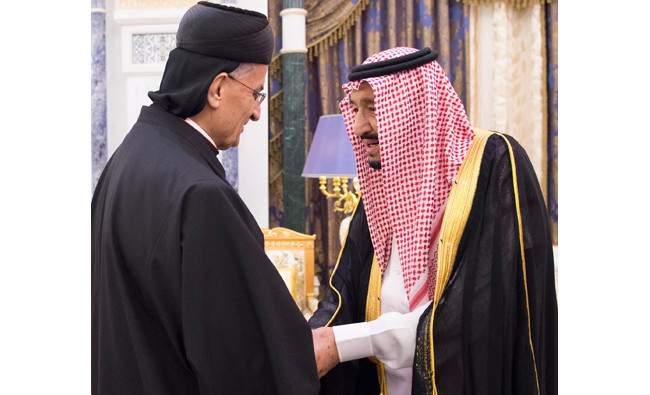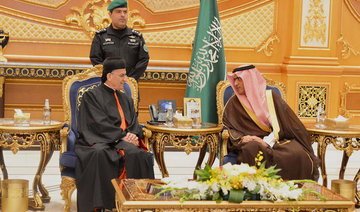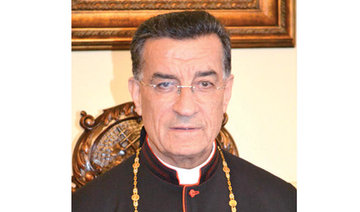JEDDAH: King Salman received, Tuesday, the Lebanese Maronite Patriarch Beshara Boutros Al-Rahi in his office at Al-Yamamah palace in Riyadh.
During the meeting, they reviewed the fraternal relations between the Kingdom and Lebanon and stressed the importance of the role of different religions and cultures in promoting tolerance, renouncing violence, extremism, terrorism and achieving security and peace for the peoples of the region and the world.
The meeting was attended by Minister of Interior Prince Abdulaziz bin Saud bin Nayef bin Abdul Aziz, Minister of State and Cabinet’s Member Musa’ed bin Mohammed Al-Aiban; Foreign Minister Adel Al-Jubeir and Minister of State for Arab Gulf Affairs Thamer Al-Subhan.
King Salman receives Lebanese Patriarch Maronite Beshara Al-Rahi
King Salman receives Lebanese Patriarch Maronite Beshara Al-Rahi

Dalai Lama expected to reveal succession plan during 90th birthday celebrations
- Nobel laureate and one of the world’s most influential figures, the Dalai Lama turns 90 on Sunday
- Spokesman of Tibetan government-in-exile says a statement by Dalai Lama expected this week
NEW DELHI: The Dalai Lama announced on Monday that he was preparing to share details about his succession, as followers gathered to attend a public ceremony ahead of his 90th birthday celebrations in Dharamshala in northern India.
The 14th Dalai Lama, the spiritual head of Tibetan Buddhism, has been living in India since 1959, after he fled Tibet with thousands of others following a failed uprising against Chinese rule.
His residence is in Dharamshala, a town in the state of Himachal Pradesh, which also hosts the Tibetan government-in-exile.
A Nobel peace laureate and one of the world’s most influential figures, the Dalai Lama will turn 90 on Sunday.
“The rest of my life I will dedicate ... for the benefit of others, as much as possible,” he told his followers through a translator as they offered prayers for his long life.
“There will be some kind of a framework within which we can talk about the continuation of the institution of the Dalai Lamas.”
When a Dalai Lama dies, Tibetan Buddhists believe he is reincarnated.
Senior monks and members of the Tibetan government-in-exile search for the child who is the reincarnation, relying on dreams and visions, rituals at sacred lakes, signs at the Dalai Lama’s death, and other omens.
“For the Tibetan Buddhist tradition, it’s not about succession, it’s about reincarnation,” Tenzin Lekshay, spokesperson of the Tibetan government-in-exile, told Arab News.
“There’ll be a written statement by his holiness on July 2.”
The 14th Dalai Lama was 2 years old when a search party decided he was the 14th reincarnation of Tibet’s spiritual leader.
Over the years, he has indicated that the continuation of the Dalai Lama institution was ultimately up to the Tibetan people and if they no longer found it relevant, it could cease to exist, and there would be no 15th Dalai Lama.
“His holiness has said many times also that if the Tibetan people wish the Dalai Lama institution to remain, then the Dalai Lama institution will remain,” Lekshay said.
In his autobiography published in March 2025, the Dalai Lama said he had been receiving petitions requesting that the lineage be carried on, and that when he turns 90, he would “consult the high lamas of the Tibetan religious traditions as well as the Tibetan public, and if there is a consensus that the Dalai Lama institution should continue.”
If they decide in favor, “then formal responsibility for the recognition of the 15th Dalai Lama should rest with the Garden Phodrang Trust (the office of the Dalai Lama).”
UAE and Jordan condemn terror attack on Pakistani military convoy that killed 13 soldiers

- A further 24 people were injured, 14 of them civilians, when a car bomb exploded near a bomb-disposal vehicle in northwestern Pakistan on Saturday
- Emirati Foreign Ministry sends condolences to families of the victims and the people of Pakistan following the ‘cowardly attack’
LONDON: Authorities in the UAE and Jordan have strongly condemned a terrorist attack on a military convoy in the Khyber Pakhtunkhwa province of Pakistan in which 13 soldiers were killed and at least 24 people were injured.
The Emirati Ministry of Foreign Affairs sent its condolences to the families of the victims, and all the people of Pakistan, following the “heinous and cowardly attack,” along its best wishes for a speedy recovery of those who were injured.
It added that the UAE firmly rejects all forms of terrorism and violence that undermine security and stability.
Jordan’s Foreign Ministry similarly condemned the attack and expressed its solidarity with Pakistan during this terrible time.
A suicide bomber rammed a car packed with explosives into the military convoy on Saturday and it detonated near a bomb disposal vehicle. Of the 24 people who were injured, 14 are civilians.
Armed group Hafiz Gul Bahadur, a faction of the Pakistani Taliban, claimed responsibility for the attack. It was one of the deadliest, single-day incidents in recent months targeting security forces in Khyber Pakhtunkhwa province.
Law firm that helped ban pro-Palestine protests on UK campus assisting other universities

- Shakespeare Martineau LLP helped Cardiff University obtain 12-month ban on protests
- Students, staff face unlimited fines, up to 2 years in prison amid ‘chilling precedent for academic institutions’
LONDON: A law firm in the UK that helped a university ban pro-Palestine protests on campus has been assisting other higher education institutions considering legal action against their students.
Shakespeare Martineau LLP represented Cardiff University in a case that resulted in a year-long ban on unauthorized campus protests from June.
The case could result in unlimited fines for staff and students found in breach of the injunction, as well as prison terms of up to two years.
Those wishing to hold protests on Cardiff’s campus will be required to apply for permission up to three weeks in advance.
Earlier this year, similar 12-month injunctions were granted to two colleges at Cambridge University
The Guardian reported on Monday that the law firm promoted the type of injunction, known as a “newcomer injunction” because it can be used “against persons unknown,” to other universities during a webinar held in October.
According to a freedom of information act obtained in conjunction with Liberty Investigates, it was found that representatives of Reading, Exeter, Northumbria, Hertfordshire, Birkbeck, Bath Spa and Liverpool John Moores universities registered for the webinar.
The Guardian reported that lawyers acting in the case against Cardiff warned that the injunction was too broad and could affect industrial action.
A UN watchdog, the newspaper reported, said the move is a “flagrant violation of international human rights law,” while Gina Romero, UN special rapporteur for freedom of assembly, said: “Profiting from the … curtailing of human rights is despicable.”
A spokesperson for Shakespeare Martineau said the injunction relates to “unlawful encampments,” and “lawful” protest would not be affected.
Smita Jamdar, head of education at Shakespeare Martineau, said: “Universities are dealing with complex situations on campus every single day. Understandably, many institutions are seeking guidance on how to manage a whole host of situations effectively and safely, while upholding the law and balancing the rights and freedoms of the whole campus community.”
But the European Legal Support Centre called the use of the injunctions a “chilling precedent for academic institutions,” adding that they are “legally complex and financially impractical for affected students to challenge in court.”
Last week, England’s Office for Students warned universities against “sweeping” limits on protest in a new set of guidelines due to take effect in August.
Pakistan plans naval, air collaboration in unmanned systems to boost indigenous capabilities

- The development comes weeks after a four-day Pakistan-India military standoff, which saw a widescale use of drones by them
- Small-scale drone attacks can strike targets without risking defense personnel or provoking uncontrollable military escalation
ISLAMABAD: Pakistan’s naval and air forces will be undertaking a strategic collaboration to advance indigenous capabilities in unmanned warfare systems, the country’s military said on Monday, citing Pakistan Navy Chief Admiral Naveed Ashraf.
The development comes weeks after a four-day military standoff between Pakistan and India, in which the two countries traded fighter jet, missile, drone and artillery fire, leaving 70 people dead on both sides before a United States-brokered ceasefire on May 10.
The fighting in May marked the first time New Delhi and Islamabad utilized unmanned aerial vehicles (UAVs) at scale against each other, with defense analysts expecting increased use of UAVs by them in future as small-scale drone attacks can strike targets without risking personnel or provoking uncontrollable escalation.
During a visit to Pakistan Air Force’s (PAF) Air War College Institute in Karachi, Naval Chief Ashraf announced the initiation of more frequent, integrated joint operational exercises with PAF, aimed at further reinforcing synergy and interoperability between the two services.
“The Naval Chief also highlighted the transformative role of technological innovation in contemporary conflicts. Citing the growing significance of Unmanned Aerial Systems, he highlighted an upcoming strategic collaboration between the National Aerospace Science & Technology Park (NASTP) and Pakistan Maritime Science & Technology Park (PMSTP),” the Inter-Services Public Relations (ISPR), the military’s media wing, said in a statement.
“This partnership, he noted, will focus on advancing indigenous capabilities in unmanned systems, thereby bolstering Pakistan’s technological self-reliance and operational edge in the defense sector.”
The development comes as the two South Asian neighbors, which spent more than $96 billion on defense last year, appear to be locked in a drones arms race.
India plans to invest heavily in local industry and could spend as much as $470 million on UAVs over the next 12 to 24 months, roughly three times pre-conflict levels, Smit Shah of Drone Federation India, which represents over 550 companies and regularly interacts with the government, told Reuters last month.
The PAF, meanwhile, is pushing to acquire more UAVs as it seeks to avoid risking its high-end aircraft, Reuters quoted a Pakistani source familiar with the matter as saying.
Pakistan and India both deployed cutting-edge 4.5 generation fighter jets during the latest clashes but cash-strapped Islamabad only has about 20 high-end Chinese-made J-10 fighters compared to the three dozen Rafales that Delhi can muster.
Pakistan is likely to build on existing relationships to intensify collaboration with China and Turkiye to advance domestic drone research and production capabilities.
Speaking to participants of an air war course in Karachi, Admiral Ashraf underscored that operational preparedness remains the cornerstone of triumph in modern warfare.
“He referenced recent developments along the eastern front as a vivid illustration of the critical need for constant readiness and strategic foresight,” the ISPR said.
“Emphasizing the imperative of cohesive national defense, he stressed the importance of inter-services collaboration in achieving strategic objectives.”
India and Pakistan, bitter rivals since they gained independence in 1947 from British rule, have fought three wars, including two over the disputed Himalayan territory of Kashmir.
The latest crisis was also triggered by an attack in Indian-administered Kashmir, which New Delhi blamed on Pakistan-backed militants without offering any evidence. Islamabad denied the allegation.
Israeli parliament committee advances expulsion of Arab Israeli parliamentarian over social media post

- Knesset members vote to advance impeachment proceeding against Ayman Odeh, who said Monday’s vote was proof they ‘hate us more than they love democracy’
- Motion based on January post in which Odeh welcomed the release of Palestinian prisoners as part of a hostage exchange with Hamas
LONDON: An Israeli parliamentary committee has advanced a motion to expel Arab-Israeli Knesset member Ayman Odeh over a social media post in which he called for freedom for Israelis and Palestinians.
Odeh, a veteran member of the Knesset and head of the Hadash-Ta’al party, faced a second hearing on Monday. In a heated session, lawmakers, including members of the opposition Yesh Atid and National Unity parties, voted 14-2 in favor of advancing impeachment proceedings.
“The opposition crossed a red line today,” Odeh said in a statement after the vote. “Instead of fighting the Kahanist government, it collaborated with them in crushing democratic space. Some of them hate us more than they love democracy.
“This is not an opposition — it is a coalition in disguise. And this is the final signature on the Nation-State Law,” he said, referring to the 2018 legislation that officially defines Israel as the nation-state of the Jewish people.
The motion targeted a January post in which Odeh welcomed the release of Palestinian security prisoners as part of a hostage exchange deal with Hamas.
“I’m happy to see the hostages and prisoners released,” Odeh wrote in the social media post cited in the motion filed by Likud Knesset member Avichay Boaron. “Next we must free both peoples from the burden of the occupation. We were all born free,” the post concluded.
Committee chairman Ofir Katz, a Likud member of the Knesset, said at the start of the hearing that “Odeh has not apologized or retracted his statements, he’s only doubled down, equating hostages with terrorists and making serious accusations against IDF soldiers.”
The hearing unfolded in a tense atmosphere, with two Knesset members reportedly ejected after clashing with other committee members while defending Odeh, according to Israeli outlet Haaretz.
Outside the Knesset, Arab and Jewish Israelis gathered in a protest in support of Odeh, calling for the expulsion process to be halted.
The final decision now moves to the Knesset floor, where a two-thirds majority — 90 out of 120 lawmakers — is required to remove a sitting member. Odeh would retain the right to appeal the decision in court.
Despite repeated attacks by coalition lawmakers, including accusations of being a “terrorist” who “would face a firing squad” elsewhere, Odeh has appealed to the opposition to block the motion and prevent what he calls an erosion of democratic norms.
Knesset members Ahmad Tibi (Hadash-Ta’al) and Walid Taha (United Arab List), both members of the Joint List, called the move “political persecution” and a dangerous precedent.
“Instead of defending freedom of expression, most opposition factions are aligning with the extremist coalition to silence Arab elected officials.”























